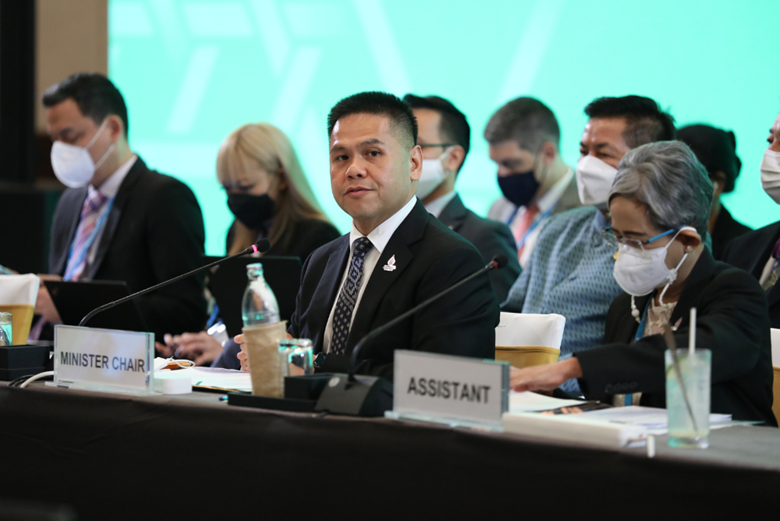Chair’s Statement of the 5th APEC Meeting of Ministers Responsible for Forestry

- The Asia-Pacific Economic Cooperation (APEC) Ministers Responsible for Forestry (MRF), met in Chiang Mai, Thailand, from 23-25 August 2022, under the chairmanship of H.E. Mr. Varawut Silpa-archa, Minister of Natural Resources and Environment of Thailand. The Statement of the Chair reflects the Chair's assessment of the prevailing views of all APEC member economies as expressed during the course of the meeting.
- The Meeting acknowledged Thailand host year theme on “Open. Connect. Balance.” with the bio-circular-green (BCG) economy model that integrates three economic approaches, where technology and innovation are used to create value, reduce waste, and promote a sustainable business model. The priority of “Balance” refers to balance all aspects which focuses on promoting inclusive and sustainable growth, with forest resource as one of the key focus areas.
- The Meeting re-emphasized the APEC Putrajaya Vision 2040, which affirmed the commitment to deliver an open, dynamic, resilient and peaceful Asia-Pacific community, and to promote economic policies, cooperation and growth which support global efforts to comprehensively address all environmental challenges, including climate change, extreme weather and natural disasters, and to deliver a free, open, fair, non-discriminatory, transparent and predictable trade and investment environment,
- Welcoming the Aotearoa Plan of Action, which sets out individual and collective actions towards achieving the Vision, including to advance environmentally sustainable and resilient growth and sustainable management of forest resources, to combat illegal logging and associated trade, to exchange best practices, and to promote economic policies and capacity building programmes that address all environmental challenges and support sustainable growth,
- The Meeting congratulated economies on the achievement of the APEC 2020 Forest Cover Goal, set out in the 2007 Sydney APEC Leaders’ Declaration on Climate Change, Energy Security and Clean Development, as the region’s forest cover increased by 27.9 million hectares between 2007 and 2020, exceeding the original goal of 20 million hectares by 2020, and acknowledging the support of Asia-Pacific Network for Sustainable Forest Management and Rehabilitation (APFNet) and United Nations Food and Agriculture Organization (FAO)and other forest-related organizations,
- The Meeting addressed important issues to:
- Reaffirm the implementation of the existing APEC commitments that relate to sustainable forest management, forest conservation and forest restoration
- Intensify our efforts to maintain forest cover, halt and reverse forest loss, restore and sustainably manage forests as well as increase forest and green areas in urban and sub-urban areas, to enhance livelihoods while also increasing attention to vulnerable groups, including women, youth and girls in all their diversity
- Strengthen the cooperation in combatting illegal logging and associated trade, by establishing and implementing effective policies within individual economies, sharing information and best practices among APEC economies and promoting legal timber trade
- Further strengthen cooperation with international organizations and other relevant stakeholders, including the private sector, in combatting illegal logging, promoting legal timber trade through joint participation in EGILAT and other initiatives and enhancing the use of wood and wood products derived from sustainable forest management
- Reinforce existing domestic efforts and multilateral cooperation, to work with private sector actors in the international trade of forest products
- Promote and intensify exchange of scientific knowledge to improve the science-policy interface in sustainable forest management and legal timber trade, including through cooperation, technology development and voluntary technology transfer on mutually agreed terms, and capacity-building, between APEC economies
- Integrate the consideration of forests and sustainable forest management into post-COVID-19 economic recovery, including climate and development policies, where relevant,
- Contribute efforts to the work under international forest related agreements, declarations, and conventions as relevant
- Support climate change mitigation, adaptation, and resilience, along with efforts toward effectively addressing climate change, through sustainable forest management, conservation, reforestation, and afforestation as well as sustainable wood use.,
- Encourage the application of more holistic and synergized approaches, such as Bio-Circular-Green (BCG) economy model in forest sector, particularly in sustainable forest management, to advance the existing work in promote inclusive development in and across our economies

